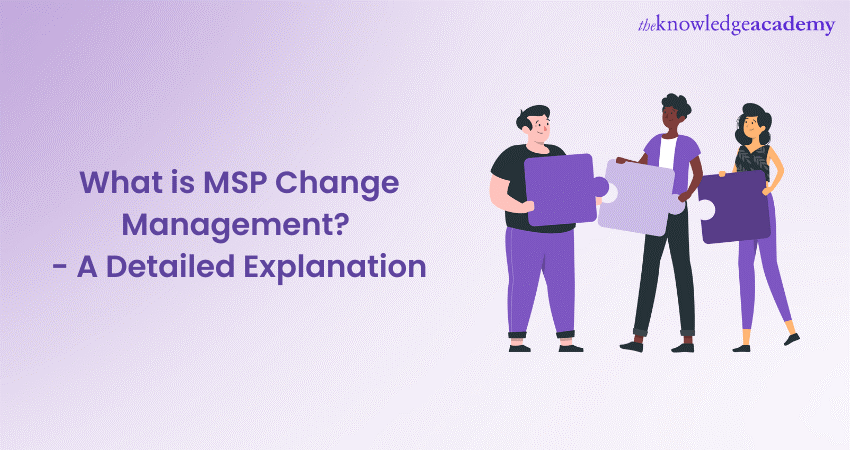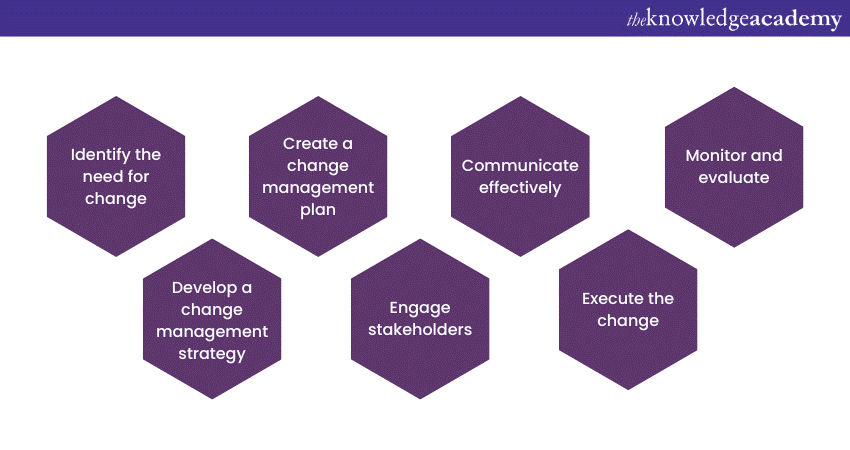We may not have the course you’re looking for. If you enquire or give us a call on +1 6474932992 and speak to our training experts, we may still be able to help with your training requirements.
Training Outcomes Within Your Budget!
We ensure quality, budget-alignment, and timely delivery by our expert instructors.

In the modern business world, the secret to staying relevant and competitive is to embrace change and adapt accordingly. Change can be daunting; however, organisations can navigate the complexities of change more effectively with the right framework and strategies in place. MSP Change Management offers a comprehensive approach to managing and implementing change.
The managed services market has grown exponentially in the past decade. According to the reports by Statista, the managed services market is estimated to cross £238 billion by 2027 globally. So, whether you are an aspiring change management professional or a business leader seeking to drive organisational change, it is important to be aware of the different aspects and benefits of MSP Change Management.
This blog will delve into what MSP Change Management means, the steps to implement it, and its benefits.
Table of Contents
1) What is MSP Change Management?
2) How do you implement MSP Change Management?
a) Identify the need for change
b) Develop a change management strategy
c) Create a change management plan
d) Engage stakeholders
e) Communicate effectively
f) Execute the change
g) Monitor and evaluate
3) Benefits of MSP Change Management
4) Conclusion
What is MSP Change Management?
MSP Change Management, which stands for Managing Successful Programmes Change Management, is a comprehensive methodology designed to facilitate effective change within organisations. It provides a structured framework for managing and implementing change initiatives in a systematic and strategic manner.
At its core, it recognises that successful change goes beyond the technical aspects of implementation. It emphasises the importance of addressing the human side of change, taking into account the thoughts, emotions, and behaviours of individuals affected by the change.
It focuses on understanding and managing the impact of change on stakeholders, including employees, customers, suppliers, and other relevant parties. It seeks to minimise resistance, foster collaboration, and create an environment conducive to change adoption. Change mangement principles will help in aligning with MSP methodologies and frameworks.
Ready to enhance your skills in MSP Change Management? Sign up for our MSP® Training Courses today!
How do you implement MSP Change Management?
Implementing MSP Change Management requires a systematic and well-structured approach. Here are the main steps involved in implementing it:

1) Identify the need for change
The first step is to identify the need for change within the organisation. This involves analysing the current state and assessing the challenges, opportunities, and areas for improvement. By understanding the drivers and reasons behind the change, organisations can set clear objectives and define the scope of the change initiative.
2) Develop a change management strategy
The change management strategy acts as a guiding document throughout the change process. This strategy outlines the change initiative's approach, goals, and desired outcomes. It also defines the roles and responsibilities of key stakeholders, establishes communication channels, and sets the criteria for success.
3) Create a change management plan
Organisations should create a detailed change management plan with the change management strategy in place. This plan outlines the specific actions, tasks, and timelines to implement the change initiative. It includes sequencing activities, resource allocation, and risk mitigation strategies. The change management plan serves as a roadmap for executing the change and ensures that all necessary steps are coordinated.
4) Engage stakeholders
Engaging stakeholders involves identifying and involving all relevant stakeholders, including employees, leaders, customers, and external partners. Effective stakeholder engagement creates a sense of ownership, builds support for the change initiative, and fosters collaboration.
Discover what is change management and transform your organization today
5) Communicate effectively
Clear and consistent communication is vital for successful change implementation. Organisations should develop a communication plan outlining the key messages, communication channels, and timing for sharing information about the change initiative. The communication plan should address the needs of different stakeholder groups and ensure that everyone is well informed about the change's purpose, benefits, and progress.
6) Execute the change
The execution phase involves implementing the change according to the defined plan. This includes coordinating activities, allocating resources, and monitoring progress. Ensuring the change is carried out systematically, with minimal disruption to the organisation's operations, is essential.
7) Monitor and evaluate
Monitoring and evaluating the change initiative is vital to assess its progress and make necessary adjustments. This involves tracking key performance indicators, gathering stakeholder feedback, and conducting regular reviews. By monitoring the change implementation, organisations can identify potential issues, address challenges, and make informed decisions to ensure the change initiative's success.

Benefits of MSP Change Management
MSP Change Management offers numerous benefits for organisations that embrace its methodology. Let's explore the key advantages of implementing it in organisations:
1) Minimises resistance to change: Change often encounters resistance from employees and stakeholders. MSP Change Management provides a structured approach to address resistance by involving stakeholders throughout the change process.
2) Enhances employee morale: It focuses on addressing employees' concerns and providing them with the necessary support and resources. By involving employees in the change process, encouraging open communication, and providing training, MSP Change Management Process enhances employee morale, job satisfaction, and productivity.
3) Improves success rate of change: By following the defined steps and strategies, organisations can effectively plan, execute, and monitor change initiatives. This structured approach helps organisations avoid common pitfalls, minimises the risk of failure, and increases the success rate of change initiatives.
4) Reduces risks and costs: Change initiatives come with inherent risks and costs. MSP Change Management emphasises the identification and mitigation of risks associated with change. Organisations can proactively identify potential obstacles and develop contingency plans by conducting thorough risk assessments.
5) Drives organisational alignment: It aligns change initiatives with the organisation's strategic objectives and goals. It ensures that the change efforts are consistent with the ultimate vision of the organisation. This alignment helps create a sense of purpose and clarity, ensuring that the change initiative contributes to the organisation's long-term success.
6) Enables continuous improvement: It promotes a culture of continuous improvement within the organisation. It encourages organisations to learn from their change initiatives, gather feedback, and make necessary adjustments. Organisations can enhance their change management capabilities by incorporating lessons learned into future change initiatives and driving ongoing improvement.
Explore the gateway to professional growth with our MSP® Foundation & Practitioner Course today!
Conclusion
In a rapidly evolving business landscape, MSP Change Management has emerged as a vital methodology for organisations seeking to navigate the complexities of change. We hope this blog has aided in improving your understanding of the concept, its benefits, and the steps to implement it effectively.
Establish yourself as a capable change management professional – Register for our MSP® Foundation Course now!
Frequently Asked Questions
Upcoming Project Management Resources Batches & Dates
Date
 MSP® Foundation & Practitioner
MSP® Foundation & Practitioner
Mon 13th Jan 2025
Mon 10th Mar 2025
Mon 12th May 2025
Mon 14th Jul 2025
Mon 15th Sep 2025
Mon 17th Nov 2025







 Top Rated Course
Top Rated Course


 If you wish to make any changes to your course, please
If you wish to make any changes to your course, please


